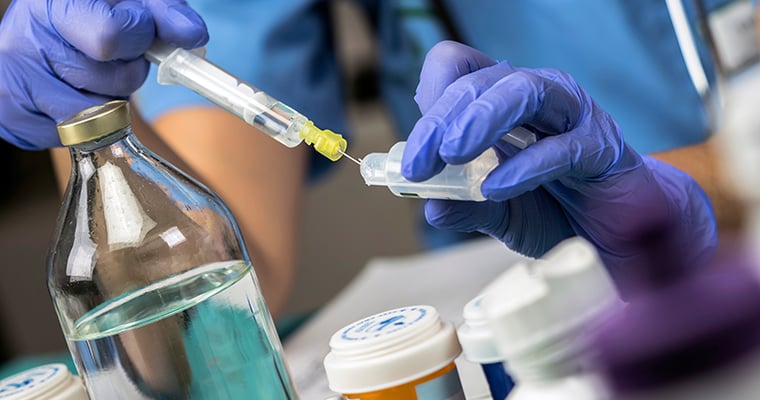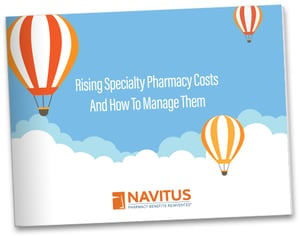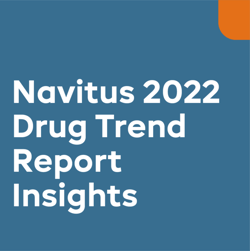More than 75% of pharmaceutical manufacturers are choosing to limit the number of pharmacies that can dispense certain specialty medications.1 Find out why you should keep these medications on your radar and work with a specialty pharmacy that has access to them.
What Is A Limited Distribution Drug?
Limited Distribution Drugs (LDDs) are exactly as they sound — manufacturers restrict distribution to only a small number of pharmacies. They are almost always specialty medications, expensive outpatient drugs with an average annual cost of over $78,0002 that treat complex, chronic conditions such as multiple sclerosis and oncology. How LDDs differ from other specialty medications is that they typically require complex treatment regimens that are difficult to manage.

Why Do Manufacturers Choose to Limit Distribution?
There are several key reasons why pharmaceutical manufacturers limit the distribution of their products. One consideration is the size of the patient population and the disease state management criteria needed for positive patient outcomes. The specialty pharmacy’s ability to deliver high touch service and meet data management needs are critical to successful outcomes. These high-cost medications also require special supply chain tools ranging from inventory management to cold chain delivery to REMS (risk evaluation and mitigation strategies) programs.
Superior services to ensure better patient care — Specialty medications often require complex treatment regimens, which can be difficult for pharmacists and patients to administer. With LDDs, manufacturers can improve patient care by only dispensing through specialty pharmacies with clinical expertise in specific conditions or patient populations, such as oncology, and that are able to deliver services such as education, treatment monitoring and medication adherence programs.
Access to pharmacy data allows for improved patient outcomes — By limiting the number of pharmacies who have access to a drug, manufacturers are better able to acquire and track pharmacy data, which they can use to ensure proper prescribing and adherence for improved patient outcomes. This may include data on adherence rates, prescriber information and patient data.
Inventory management to ensure patient access — With limited distribution, manufacturers can better manage supply relative to demand to ensure patient access and reduce waste. The size of a LDD network is determined in part by anticipated utilization. Consequently, orphan drugs are often distributed by a single specialty pharmacy with a particular focus and expertise in that disease state and/or drug category.
How Does a Manufacturer Choose a Specialty Pharmacy?
When choosing a specialty pharmacy for a LDD, manufacturers take into account many factors that can affect treatment success and patient health.
For instance, manufacturers typically partner with specialty pharmacies that can supply them with data, including patient health information (PHI) with blinded dispensing data (medication name, strength, dosage form and quantity), patient demographics, refill history and details about prescriber behavior. It’s especially beneficial to partner with a pharmacy that can share outcomes to help monitor treatment effectiveness and deliver improved patient outcomes.
In addition, manufacturers look for specialty pharmacies that offer services to assist patients with medication adherence and financial assistance services. They also often collaborate with and require specialty pharmacies to have a robust clinical program specific to their product. This ensures that patients who receive the product are supported by clinical experts that can provide the appropriate education along with personalized support.
Finally, manufacturers value pharmacies that meet specialty pharmacy accreditation standards such as URAC, ACHC and CPPA, and demonstrate effective quality programs to improve the quality of care patients receive. An ideal specialty pharmacy partner can ensure that the LDD is properly packaged and delivered on-time, with contingency plans for delays.
Why LDDs Matter for Plan Sponsors
It’s important for plan sponsors to feel comfortable about the clinical and program quality of the specialty pharmacy that’s managing these very expensive medications for their members. When evaluating a specialty pharmacy be sure to ask about the services available for LDDs. A good specialty pharmacy will help you, as the plan sponsor, get the most from your medication investment by managing your members’ conditions well and reducing the potential for additional costs that may come from lapses in treatment that lead to complications and unexpected hospital visits.
Learn More About Specialty Medications
To learn more about specialty medications, be sure to check out our 3-part specialty series.
- Three Simple Steps to Cut Specialty Drug Costs
- Best Practices for Patient Care
- Medical Pharmacy Solutions
For more insights about specialty medications cost, download our e-book: Rising Specialty Pharmacy Costs and How to Manage Them.

1. Pillai I. Limited Distribution Drugs 101. Decision Resources Group. https://decisionresourcesgroup.com/blog/limited-distribution-drugs-101/. Published September 27, 2019. Accessed August 19, 2020.
2. Paavola A. Average annual price of specialty drugs has nearly tripled since 2006, study finds. Becker’s Hospital Review. https://www.beckershospitalreview.com/pharmacy/average-annual-price-of-specialty-drugs-has-nearly-tripled-since-2006-study-finds.html. Published June 25, 2019. Accessed September 21, 2020.





